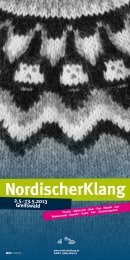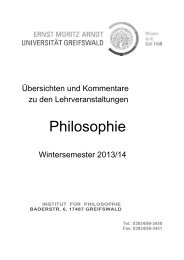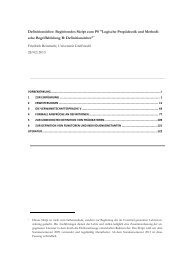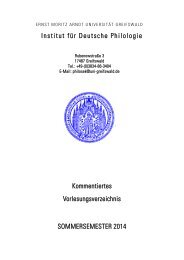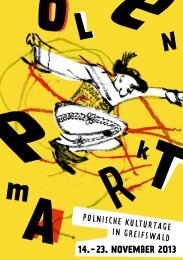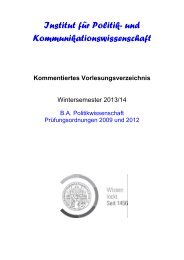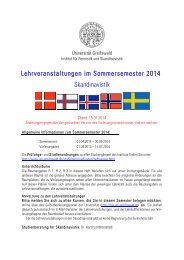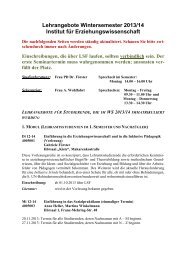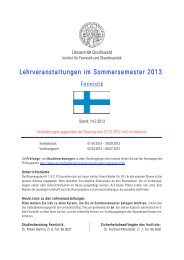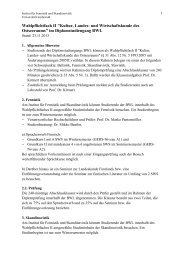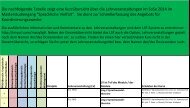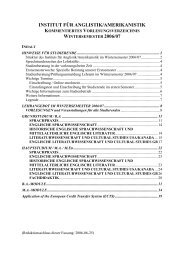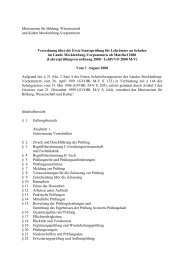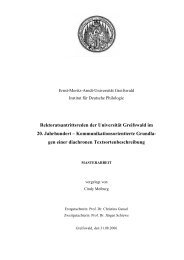ANGLISTIK/AMERIKANISTIK
ANGLISTIK/AMERIKANISTIK
ANGLISTIK/AMERIKANISTIK
Create successful ePaper yourself
Turn your PDF publications into a flip-book with our unique Google optimized e-Paper software.
Novels for discussion in class:<br />
Jane Austen. Pride and Prejudice. Penguin Classics Edition. (ISBN-10: 0141439513)<br />
Charlotte Bronte. Jane Eyre. Penguin Classics Edition. (ISBN-13: 978 014 144 114 6)<br />
Please be sure to buy the ‘classics’ editions and not the ‘popular classics’ editions.<br />
Helen Fielding. Bridget Jones’s Diary. Macmillan Edition (ISBN-10: 0330332775)<br />
maximum participants: 30<br />
The English Sonnet from the Renaissance to the Present (Proseminar) 4002043<br />
2 SWS ab 2. Sem. Mo 16-18 R 34 James Fanning<br />
Ever since the days of Dante and Petrarch the history of European poetry has been<br />
unthinkable without the sonnet. After a brief consideration of its origins, we shall read and<br />
discuss a selection of works in this ubiquitous form, from its introduction into England by<br />
Wyatt and Surrey in the time of Henry VIII to the present. (Sonnets are less common now, but<br />
they are still being written; and of course the majority are on love, but not all ...)<br />
Primary texts will be provided in a reader available from Digital Print Copy<br />
(Loefflerstr./Kuhstr.) by the middle of March.<br />
Recommended introductory reading:<br />
Spiller, Michael G. The Development of the Sonnet: an introduction. Abingdon: Routledge<br />
1992 (covers early Italian sonnets and English poets up to Milton)<br />
maximum participants: 30<br />
Hamlet on screen (Proseminar) 4002045<br />
2 SWS ab 2. Sem. Di 10-12 R 34 Conny Loder<br />
This seminar will look at various screen adaptations of the play Hamlet. This, being one of the<br />
most often produced Shakespeare plays on stage, inspires film directors worldwide. We will<br />
look at Hamlet adaptations by Lawrence Olivier, Franko Zeffirelli, Kenneth Branagh and<br />
Michael Almereyda. We will also discuss Herbert Fritsch’s ongoing project, Hamlet_X, and<br />
the internationally acclaimed Chinese adaptation, Feng Xiaogang’s The Banquet. How do<br />
those directors approach the character Hamlet? How are the corrupt political affairs of a rotten<br />
Denmark transported into twentieth and twenty-first century society? How are the motifs of<br />
revenge, madness and sexuality presented in these productions? These are only some of the<br />
questions the seminar aims to answer. The productions discussed will be shown in their<br />
entirety outside of class; dates to be confirmed in the first week of class.<br />
maximum participants: 25<br />
Between Fact, Fiction, and Factory: the Victorian Condition of England Novel (Seminar)<br />
4002046<br />
2 SWS ab 3. Sem. Di 12-14 R 34 Mascha Gemmeke Hansen<br />
Britain’s industrial age produced not only great technical innovations but also great books: the<br />
so-called social or industrial novels of the nineteenth century, castigating the factories and<br />
their inhuman working conditions, as well as the Condition-of-England novel, exploring and<br />
deploring the rising gap between rich and poor, owners and workers. This class will focus on<br />
some of the most famous ones: Charles Dickens’s Hard Times; Elizabeth Gaskell’s Mary<br />
Barton; and Benjamin Disraeli’s Sybil or the Two Nations.<br />
Before you enrol for this seminar, please check the notice boards to see whether it will<br />
actually take place.<br />
maximum participants: 35<br />
16



